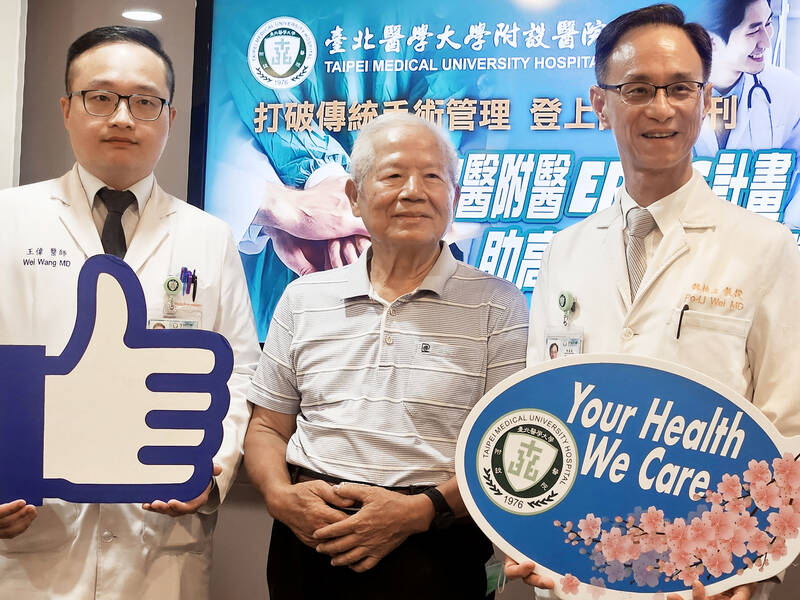The Taipei Medical University Hospital yesterday said its enhanced recovery after surgery (ERAS) program including people older than 80 years significantly reduces postoperative recovery time and complications.
An 80-year-old man underwent a surgery for colon cancer, but thanks to the program he was hospitalized for only six days, the hospital said.
The man, surnamed Wang (王), said he was working in Vietnam when he experienced gastrointestinal discomfort for a period. After finding blood in his stool for longer than a week, he returned to Taiwan to take a fecal occult blood test.

Photo: CNA
The test came back positive, and a colonoscopy showed that he had stage two colon cancer, he said.
His doctor suggested he receive a minimally invasive laparoscopic surgery, he said.
Wang said his mother also had a colon surgery when she was in her 70s, but died shortly after her second surgery, so he was nervous about the operation.
The medical team clearly explained the ERAS program and treatment procedures to him, and he was able to eat and return home one day and four days after the surgery respectively, he said.
The hospital’s vice superintendent Wei Po-li (魏柏立) said about 10 percent of colon cancer patients are aged 80 years or older, and the Ministry of Health and Welfare estimates that the percentage would increase to 20 percent by 2040.
Elderly people face a higher risk of experiencing postoperative complications, he said.
The ERAS program has been introduced in several hospitals across the nation.
The hospital said it included people older than 80 in the program.
ERAS is “a multimodal perioperative care pathway designed to achieve early recovery for patients undergoing major surgery,” the ERAS Society’s Web site says.
Wei said the ERAS program includes preoperative physical training and nutrition support to prepare patients for the surgery, and careful anesthetic management during surgery to minimize the use of surgical drains and nasogastric tubes.
These allow patients to recover faster after the surgery, he said.
Many elderly patients are unwilling to leave their bed after surgery, the hospital said.
However, the hospital’s medical team encourage those who do not have special post-operative conditions to get up and walk around as soon as possible, as it can also stimulate intestinal peristalsis and prevent pneumonia, deep vein thrombosis and other conditions that might be caused by prolonged bed rest, it said.
The hospital said its ERAS medical team has analyzed data collected from 114 patients aged 80 to 89, comparing those in the program with others, and found that the program can reduce postoperative recovery time by an average of 30 percent, reduce postoperative complications by 25 percent, and reduce overall hospitalization duration by 40 percent.
Their findings have been published in the Journal of the American Geriatrics Society this year, it added.

Nipah virus infection is to be officially listed as a category 5 notifiable infectious disease in Taiwan in March, while clinical treatment guidelines are being formulated, the Centers for Disease Control (CDC) said yesterday. With Nipah infections being reported in other countries and considering its relatively high fatality rate, the centers on Jan. 16 announced that it would be listed as a notifiable infectious disease to bolster the nation’s systematic early warning system and increase public awareness, the CDC said. Bangladesh reported four fatal cases last year in separate districts, with three linked to raw date palm sap consumption, CDC Epidemic Intelligence

The manufacture of the remaining 28 M1A2T Abrams tanks Taiwan purchased from the US has recently been completed, and they are expected to be delivered within the next one to two months, a source said yesterday. The Ministry of National Defense is arranging cargo ships to transport the tanks to Taiwan as soon as possible, said the source, who is familiar with the matter. The estimated arrival time ranges from late this month to early next month, the source said. The 28 Abrams tanks make up the third and final batch of a total of 108 tanks, valued at about NT$40.5 billion

Two Taiwanese prosecutors were questioned by Chinese security personnel at their hotel during a trip to China’s Henan Province this month, the Mainland Affairs Council (MAC) said yesterday. The officers had personal information on the prosecutors, including “when they were assigned to their posts, their work locations and job titles,” MAC Deputy Minister and spokesman Liang Wen-chieh (梁文傑) said. On top of asking about their agencies and positions, the officers also questioned the prosecutors about the Cross-Strait Joint Crime-Fighting and Judicial Mutual Assistance Agreement, a pact that serves as the framework for Taiwan-China cooperation on combating crime and providing judicial assistance, Liang

A group from the Taiwanese Designers in Australia association yesterday represented Taiwan at the Midsumma Pride March in Melbourne. The march, held in the St. Kilda suburb, is the city’s largest LGBTQIA+ parade and the flagship event of the annual Midsumma Festival. It attracted more than 45,000 spectators who supported the 400 groups and 10,000 marchers that participated this year, the association said. Taiwanese Designers said they organized a team to march for Taiwan this year, joining politicians, government agencies, professionals and community organizations in showing support for LGBTQIA+ people and diverse communities. As the first country in Asia to legalize same-sex